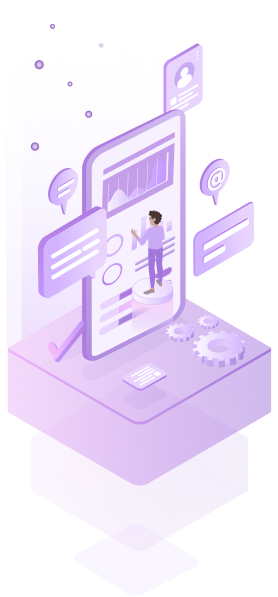In today’s rapidly evolving business world, a CRM (Customer Relationship Management) system is more than just a tool; it’s an essential strategy for customer engagement and business growth. From recording intricate details of transactions to tracking every interaction with customers, a CRM system plays a pivotal role. While ready-made solutions flood the market, the demand for bespoke CRM development is steadily on the rise.
In this comprehensive guide, we’ll uncover the unmatched benefits of custom CRM systems, dispelling the shadows over generic options, and providing a deep dive into the development process.
Understanding CRM Systems: A Brief Overview

A CRM system isn’t just software; it’s a digital solution crafted to document, track, and analyze client interactions. By choosing a CRM system, businesses can look forward to:
- Streamlining sales operations.
- Introducing automation in critical business areas.
- Boosting customer retention rates.
- Crafting a productive workspace for team members.
Is a CRM System Right for You?
While some niche businesses, dealing with a closed group of long-term associates, might not see immediate benefits from a CRM, it becomes a necessity for growth-focused enterprises. If expanding your customer base, tapping into newly made sales channels, or rolling out effective advertising campaigns are on your agenda, then every lead, every interaction, and every piece of data matters. And that’s where a CRM system steps in, ensuring optimal utilization of resources and a deep understanding of your target audience.

The Comprehensive Functions of a CRM System: Driving Business Success
Never Miss a Client Again:
One of the core strengths of a CRM system is its ability to log every call and query, ensuring that potential leads never fall by the wayside. A full spectrum of customer interaction history is at managers’ fingertips, empowering them to customize their propositions perfectly aligned with customer needs.
Elevate Your Sales:
CRM systems excel in process automation, granting managers the capability to efficiently address all queries. By gaining a deeper understanding of their clientele, businesses can tailor offerings to fit distinct preferences. When customers experience such bespoke treatment, they’re naturally inclined to return, fostering sales growth.

Empower Team Synergy:
In smaller enterprises, role definitions can sometimes blur, resulting in a scenario where responsibilities overlap. The result? Accountability becomes hazy. Enter CRM systems, armed with collaborative tools that seamlessly delineate tasks, boosting productivity.
Keeping Tabs on Management Efficiency:
A standout feature of CRM systems is their ability to chronicle work hours in detail. This meticulous tracking enables businesses to discern the average hours allocated to specific tasks, pinpoint potential inefficiencies, and readjust work distribution when needed.
Infusing Transparency into Business Operations:
Setting tangible key performance indicators (KPIs) for diverse processes is simplified with a CRM system in place. Moreover, if there’s a new strategy or tool on the horizon, its effectiveness can be swiftly gauged, courtesy of the integrated metrics.
Data Analytics at its Best:
Continuous surveillance of customer data is a hallmark of CRM systems. They provide a panoramic view of client activity across all sales funnel stages – from understanding the bulk at various phases to identifying potential bottlenecks and even calculating the typical duration from the first touchpoint to sealing the deal.
Smoothing the Deal Sealing Process:
Each lead’s current position in the sales funnel is vividly portrayed, assisting managers in guiding it to fruition.
For colossal corporations, sifting through vast amounts of data, tasks, and clientele without the aid of a CRM system would be a Herculean task. Yet, it’s not solely the giants of the industry that reap benefits. Small to medium enterprises (SMEs) also harness the potential of CRM systems to minimize expenses and amplify returns on promotional endeavors.
Having elucidated the multifarious advantages of deploying a CRM system, our journey continues as we delve into the nuances of making an astute selection.
Comparing CRM Systems: Off-the-Shelf vs. Custom-Built
In the complex world of business, one size doesn’t fit all. The same applies to CRM systems, with the decision between a ready-made solution and a tailored one playing a pivotal role in shaping business efficiency.
Let’s draw a comparison to illuminate the contrasts between the two:
| Criteria | Off-the-Shelf CRM Systems | Custom-Built CRM Systems |
|---|---|---|
| OPERATING PRINCIPLE | Aimed at addressing the generic needs of most businesses. | Specifically designed around your business’s unique requirements. |
| USABILITY INTERFACE | Often cluttered with unnecessary features. | Clean, streamlined interface tailored to your operational flow. |
| INTEGRATION CAPABILITIES | Provides limited options for integration. | Offers the freedom to seamlessly integrate with any external system or service. |
| TEAM MEMEBER ADDITIONS | Charges extra for every new user addition. | No caps on user additions; add freely without incurring additional expenses. |
| COST STRUCTURE | Operates on a recurring monthly subscription model. | Typically involves a one-time investment with no hidden or recurrent charges. |
| EASE OF ADOPTION | Potential steep learning curve due to complexity. | Designed for intuitive usage, complemented by training during the initial rollout. |
| CUSTAMIZATION POTENTIAL | Rigid structure with little to no modification possibilities. | Fully adaptable with ample scope for future enhancements and modifications. |
Final Thoughts:
Your choice between an off-the-shelf or custom-built CRM should be deeply rooted in your enterprise’s unique requirements. If you find that your operations align with prevalent industry norms without any standout differentiators, a generic CRM might suffice. On the other hand, if you’re navigating a business landscape teeming with bespoke needs and crave unparalleled adaptability, investing in a custom solution would be a wise move.
Choosing Between Off-the-Shelf CRM and Custom-Built CRM: A PieSoft Insight
In the realm of CRM systems, one crucial decision stands out: should you opt for a general-purpose, off-the-shelf system or go for a tailor-made solution? PieSoft delves into the nuances of this choice to offer you a clearer perspective.
The Case for Off-the-Shelf CRM Solutions:
- They provide a broad array of standardized features suitable for businesses with conventional needs.
- Their upfront costs tend to be more affordable.
- Quick deployment ensures businesses can start leveraging CRM benefits without delays.
However, it’s essential to consider the longer-term implications. The cumulative expenses tied to customization and user addition can quickly inflate. Additionally, they don’t provide the flexibility to adjust every feature to cater to distinctive business requirements.
👍🏻 If you’re starting on your CRM journey and wish to acquaint yourself with its foundational aspects, an off-the-shelf solution might be your go-to. This way, you can pinpoint any advanced functionalities you might require down the line.
The Appeal of Custom-Built CRMs:
Unlike their generic counterparts, custom-built CRMs are meticulously designed to mirror your business’s specific operations. From the get-go, you have the autonomy to outline the features you envision. So, if your business mandates a unique feature, say, providing discounts on every 11th order, a tailored CRM will have you covered. An upfront investment in custom CRM paves the way for limitless usage, coupled with the ease of making refinements as and when your business evolves.
👍🏻 A custom-built CRM emerges as the frontrunner when:
- Your organization is on a growth trajectory and grapples with scalability concerns.
- Mundane tasks start draining considerable time and resources.
- Monitoring and evaluating employee performance becomes a priority.
- Regardless of your business’s scale, a custom CRM offers unmatched versatility.
Your Partner in Custom CRM Development: PieSoft
Once you’re leaning towards a bespoke CRM, the pivotal question is: who should bring your vision to life? Here’s our perspective at PieSoft.
Engaging with specialized agencies or studios over individual freelancers is a move in the right direction. Crafting a CRM is a multifaceted endeavor, requiring a comprehensive team consisting of a UI/UX designer, frontend and backend developers, and quality assurance professionals. While cobbling together a team of freelancers is feasible, it anticipates pouring considerable energy into team coordination and fostering constructive collaboration. Alternatively, a company like PieSoft streamlines this process, providing you with a cohesive team and a seamless experience.

Navigating CRM Development Choices: The PieSoft Blueprint
Embarking on a CRM development journey warrants a meticulous approach to ensure your business needs are seamlessly addressed. Here, PieSoft offers an in-depth guide, ensuring you make informed decisions every step of the way.
Why Studios or Agencies Trump Freelancers for CRM Development:
Unified Team Dynamics:
Studios boast of experienced teams well-versed in synchronizing their efforts. Their shared history on numerous projects guarantees a harmonized collaboration and a robust outcome.
Reputation-Driven Reliability:
Agencies, bound by their brand reputation, tend to deliver with a consistency freelancers might not always match.
360-Degree Expertise:
The diverse talent pool within an agency assures you of comprehensive expertise, catering to every CRM facet – from arresting visuals to high-performing functionalities.
Ongoing Support:
While freelancers might present an allure of cost-effectiveness and adaptability, the intricate nature of CRM development nudges the scales in favor of a seasoned agency or studio.
While freelancers might present an allure of cost-effectiveness and adaptability, the intricate nature of CRM development nudges the scales in favor of a seasoned agency or studio.
Handpicking Your Development Partner
The Checklist:
Proven Track Record:
A studio with prior custom CRM projects is often better equipped to foresee and sidestep potential project pitfalls.
Unbiased Client Feedback:
Venture beyond curated testimonials. Seek authentic client feedback on independent review platforms or, if feasible, directly engage with a studio’s former clients.
Engaging Consultation:
The inaugural meeting is revealing. If a studio fumbles with articulating their proposed strategy, technology stack, or budgetary considerations, it might be time to explore elsewhere.
Inside PieSoft’s Custom CRM Development:
While software development protocols vary, here’s a window into how PieSoft crafts CRM solutions:
Discovery Excursion:
The onset is marked by a comprehensive dive into understanding client-specific challenges, aspirations, and operational nuances. This phase, peppered with potential market research, sets the foundation for the ensuing stages.
Designing & Prototyping:
Translating the outlined requirements, our UI/UX virtuosos sketch the CRM’s aesthetic and functional blueprint, culminating in a tangible prototype.
The Development Journey:
This phase sees the blueprint morphing into a functional reality, with a host of features and integrations woven in.
Assurance & Testing:
Before the green light, the CRM undergoes meticulous testing. This ensures any lurking issues are spotted and rectified, upholding the system’s reliability and performance metrics.
Deployment & Beyond:
With the CRM ready to face real-world challenges, it’s launched into its operational environment. PieSoft stands by its clients’ post-launch, offering tailored support and addressing any evolving needs.
Selecting an adept CRM development partner is a linchpin for the project’s success. PieSoft’s guidance, paired with a discerning approach to evaluating potential partners, ensures your business needs are impeccably met.
PieSoft’s Blueprint for CRM System Success: A Voyage from Kick-off to Design
The Kick-off Prelude
The Welcoming Gesture: A straightforward introduction ensures that the client knows exactly who will be piloting their project.
Charting the Route: The main project aim, for instance, “Constructing a New York-centric CRM for the construction industry,” is spotlighted.
Assigning the Characters: By demarcating roles like sales reps or inventory managers, we ensure that each function in your CRM is tailored to those handling it.
Tracing the Journey: We jointly traverse the labyrinth of processes, ensuring the CRM aligns perfectly with your enterprise’s heartbeat.
Metrics as the Compass: Discussing vital performance indicators plants the flag posts, setting clear evaluation benchmarks.
Documenting the Voyage: Understanding the types of documents to weave into the CRM assures a glitch-free flow of information.
The Tools of the Trade: Recognizing your existing software arsenal, we strategize how the CRM will dovetail with these tools.
Tech’s Role in the Story: Depending on your predominant IT landscape, we fine-tune our tech palette.
The Aesthetic Touch: Whether you favor minimalism or ornate designs, your preferences shape the CRM’s visual spirit.
Starting the journey to custom CRM development at PieSoft is like setting the stage for a grand performance. Every nuance is significant. Here’s what unfolds during our pivotal kick-off meeting:
From Abstract to Artistry: PieSoft’s Design Paradigm
At PieSoft, design isn’t just about aesthetics; it’s about articulating a vision.

Mind Map – The Blueprint: In this initial stage, our designer sketches out the CRM system’s functional heart and soul, ensuring alignment with client expectations. We take a pause here, dialoguing with clients, refining, and perfecting before advancing.
Wireframes – The Framework: A skeletal representation of the system, the wireframes are the canvas upon which our designers paint. They offer a sneak peek into the layout, facilitating early feedback and corrections.
Concept – The Visionary Glimpse: Offering clients a peek into the CRM’s potential journey, this phase is a critical checkpoint. Here, we validate our understanding, ensuring we’re on the same page as our clients.
Final Mock-ups – The Finishing Touches: Every screen is meticulously detailed, in tandem with client feedback. This ensures that the developers have a clear and holistic picture.
UI-kit – The Building Blocks: Streamlining the development journey, this curated collection of visual elements serves as a ready reference, expediting the development phase and optimizing costs.
For PieSoft, translating design into a functional reality is sacred. It’s not just about developing software; it’s about sculpting solutions tailored for real-world challenges. Our meticulous process, transitioning from the kick-off call to the design stage, is a testament to our dedication to crafting CRM systems that resonate with our clients’ visions and requirements.
Development
At PieSoft, the process of custom CRM system development is segmented into clearly defined sprints, typically spanning 2 weeks each. This structure ensures that clients remain apprised of project advancements in real-time.
Our team delves deeply into the architecture of the envisioned CRM system, commencing work with the preselected tech stack:
- Mobile applications: React Native
- Web applications: React
- Backend: NestJS
Our developer squad comprises 5-7 dedicated professionals, each playing their part in bringing the CRM system to life. While each member has their distinct area of responsibility and tasks, collectively they aim to achieve the sprint’s goal: to roll out 1-2 system features. This method allows vigilant monitoring of time and budget expenditure, informing decisions like whether to add more features if ahead of schedule, or to simplify some if lagging.
QA Testing
To uphold the system’s performance quality, concurrent with development, we undertake rigorous testing – both manual and automated. The primary aim is to identify any bugs and to assess system compatibility across various devices. By sprint’s end, while the team churns out a polished segment of the system, testers pinpoint errors. An essential feature of our approach is to address bugs on-the-fly, sidestepping any last-minute pre-release accumulation.
Release
Once the CRM system goes live and users begin engaging with it, the development phase is deemed complete. This heralds the onset of the maintenance phase. We earmark dedicated hours from a developer who was part of the product’s creation journey. This ensures code error checks, system updates, and bug rectifications.
Pricing of CRM System Development
Understandably, bespoke development is precisely that – unique. Therefore, the cost for each project hinges on its distinctive requisites. However, to provide a ballpark figure: in our model, the system boasts features like client data management, email integration for automated dispatches, an internal knowledge base, and comprehensive statistics generation.
It’s entirely possible you’ll want to drop some features we’ve included in the estimate or add some of your own. All these factors will have an impact on the final budget for the project.
In Summary: Why Your Business Needs Custom CRM Development
If you want a CRM system tailored perfectly to your business needs, handling every task seamlessly, custom development is the way to go. This ensures that every business requirement is taken into consideration. If you don’t have an in-house development team, it’s a wise move to entrust this job to a bespoke software development company.
With custom software development, you get a product with a user-friendly interface and no redundant features. Employees find it intuitive because the system’s operation is based on familiar company business processes. This means you won’t waste time on extensive training; you can immediately start automating tasks, gathering analytics, and enhancing client interaction.
PieSoft is here to assist with your CRM system development
We boast a team of 120 experts, including developers, UI/UX designers, testers, copywriters, illustrators, and project managers. Rest assured, we’ve got the skills and expertise to tackle any challenge head-on


